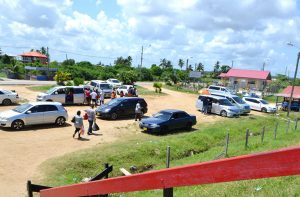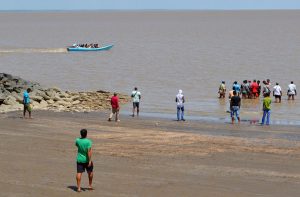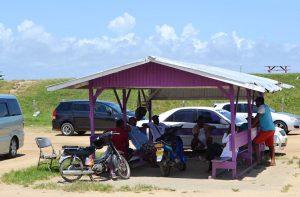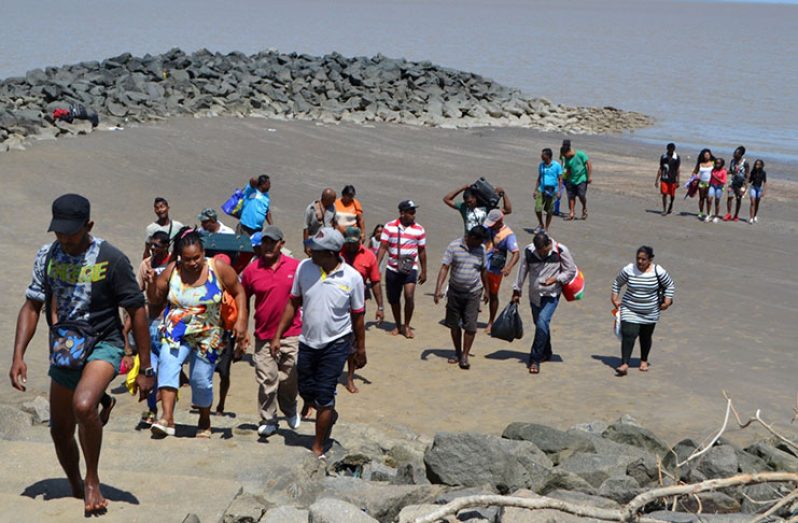— as Suriname’s economy declines
IT is a trip which lasts an average of 20 minutes and the men who stood around awaiting prospective passengers lamented the reduction in the number of persons who once traded between the “Back Track” port at the Corantijnstraat, an area on the western border of Suriname and Corriverton, Berbice.

For years, the route, which is semi-legal, has been in existence and many persons would take advantage of the less hassle the trip brings, including a substantial reduction in time it takes to travel between the two locations.
While it takes hours to travel to and be processed at the South Canal ferry terminal where the Canawaima ferry operates across the Corentyne River to Moleson Creek, the “back- track” trip is almost hassle-free.
But in recent years, the once busy port of departure has seen a vast reduction in activity; trading has decreased significantly, but passengers continue to use the route for several reasons, including medical care and the trade in contraband.
On arrival at the “back track” port last Friday, the midday sun beamed down on the area while taxi drivers and relatives awaited their loved ones’ arrival on the next boat.
Several men played a game of cards while others seemed uneasy when this publication arrived at the area. Many stared at the camera. Suddenly, after 15 to 20 minutes of waiting, a taxi driver shouted, “boat! boat!”
The men ran towards the edge of the water on the beach outside the “back track” route, some forgot to fold the bottom of their trousers or were concentrating on the small boat with approximately 15 passengers which was heading to the beach from Corriverton.
At first glance, the boat appeared filled to capacity; no one onboard seemed interested in life-jackets and as the boat neared the beach, the waiting taxi men ran into the water as the boat’s engines died. Some persons were ferried on the backs of the men from the boat towards the beach and the taxi operators competed for passengers.

NORMALCY
Moments later, the passengers disappeared in the waiting cars and everything seemed normal again. The men sat under the sheds and awaited the departure/arrival of the next boat.
The entire episode from the boat’s arrival to the passengers’ dispersal lasted a mere 15 minutes. It’s an occurrence which happens almost daily.
The passengers pay a fee of Suriname Dollars (SRD) $50 or GYD$1354 to cross the river. According to persons at the crossing, four to six boats ply the route and passengers would disembark at two locations at Corriverton. They said the boats bound for Guyana leave early during the morning hours.
Back in Nickerie, a former trader noted that five years ago the route was busy, as persons would trade items from gas stoves, clothing to cooking utensils and food between Corantijnstraat and Corriverton.
He said that he once traded clothing, a lucrative business which was profitable, but as the Suriname economy slid and the Suriname Dollar (SRD) continues to slip in value against the U.S. dollar, trading has decreased significantly.
Ashwin Budhram, a taxi driver who operates at the “back track” crossing, said that he has been working at the port for about 10 years. He said that persons utilised the route for its ease.
“People just go [to Guyana] and go back,” he said. On the contrary, persons travelled to Suriname in search of work, mainly in the fishing and banana industries.
“But is the exchange mek people don’t come here anymore,” he said. Boat operator Amir told this publication that three years ago the port was bright, and trading between the two locations occurred daily.
VIBRANCY DROPPED
Since then, the vibrancy has dropped. “Now Guyana get plenty Chinee,” Amir added. He explained that commodities such as clothing, which businesspersons once sought in Suriname, are similar to those being sold in the Chinese stores on the Guyanese side of the border.

But there remains an important reason the back track operation remains a viable option of travel, especially for the Guyanese population.
During a drive past the public hospital in Waterloostraat, Nickerie, last weekend, one would have observed the ambulances parked spick and span, several nurses and other medical staff lingering around aimlessly on the benches outside the hospital, while the gates and doors to the morgue at the side of the medical facility were locked.
According to reports from the Guyanese community in Nickerie, medical care comes at a cost, and depending on the type of ailment, some find it difficult to source money to pay medical bills.
At the local supermarket, the foreign proprietors informed this newspaper that medication such as paracetamol tablets were not available. Later, it was revealed that there is no over-the -counter trading of medicine.
Back at the crossing at Corantijnstraat, the men informed the Chronicle that Guyanese travel into the Berbice area to access medical care.
It was noted too that some Surinamese also travel to obtain medical supplies and check-ups at the hospitals on the western side of the Corentyne River. The crossing is viewed by those who utilise it as vital for travel, and while the economy in the Dutch-speaking nation is experiencing a difficult time, persons continue to travel along the “back track” route, at least for medical reasons.




.jpg)










